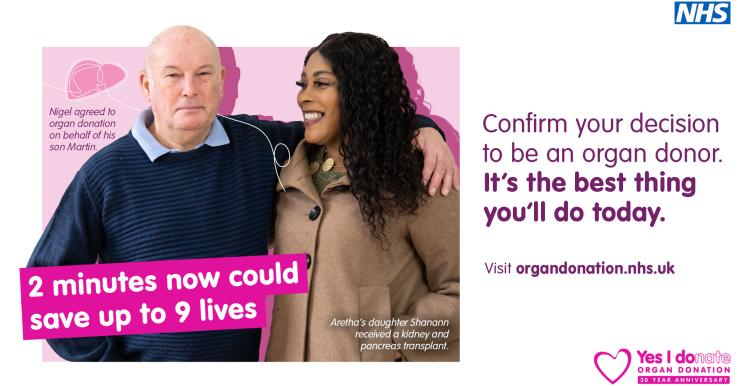Spotlight: Organ Donation Week 2024

Are you ready to celebrate 30 years of the NHS Organ Donor Register with us this September?
Almost 60,000 lives have been saved since the NHS Organ Donor Register was created in 1994 and Organ Donation Week is the perfect opportunity to highlight this incredible fact.
What is Organ Donation Week?
Organ Donation Week is a week-long campaign that takes place every year, with the aim of raising awareness about the incredible gift of organ donation.
The more people we reach, the more people who register their decision to become organ donors after they die, and the more lives we save. There are 7,600 people in need of an organ transplant right now, let’s bring hope to them and their families.
How you can help
- Register to become an organ donor online or via the NHS App
- Go pink to highlight the need for more organ donors and to remind people to register their decision
- Show your support for organ donation on social media
With your help, we can make this the best Organ Donation Week yet.
Tens of thousands of people have received life-changing transplants since the introduction of the NHS Organ Donor Register in 1994. The register enabled people to record their wishes to donate organs, helping families and clinicians to make decisions after the death of a loved one.
This Organ Donation Week, (Monday 23 to Sunday 29 September), provides an opportunity to honour the incredible gift of life that selfless donors and their families have given in death over the past 30 years.
It is also a poignant time to raise awareness that 7,731 people are still waiting for a transplant (as of 6 September 2024). More than 80% of them are waiting for a kidney.
Case Study: Kidney Transplants
There is currently no cure for kidney disease, and when it leads to kidney failure, there are only two treatment options to sustain life – dialysis or a transplant.
Dialysis is often incredibly challenging and restrictive for patients. Both peritoneal dialysis and haemodialysis, whether administered at a dialysis unit or at home, require patients to be connected to a machine over several hours on multiple days each week.
Although it is possible to have a good quality of life on dialysis, it can be exhausting and life-limiting, affecting a person's diet, work, social and family life, ability to travel and their prospects of having children.
Receiving a transplant can be transformative, removing the restrictions of dialysis and improving overall health for as long as the kidney functions. On average, a kidney transplant lasts for 20 years.
Healthwatch Salford's Knowledge & Support Officer, Elyse shares her experience of organ donation:
"In 2017 my husband was diagnosed with kidney disease (IgA nephropathy) and with the help of medication, it became stable and well-managed. Unfortunately in January 2023 my husband's kidney function rapidly declined and he quickly began dialysis. At the same time, we were also told he would be put on the national transplant register for a kidney, should a suitable match be found from a deceased donor.
In that time our life essentially was put on hold, with a young daughter, holidays and trips away postponed, our lives revolved around my husband's dialysis and treatment. We were warned it could take well over a year for a kidney to become available from a deceased donor, so we began exploring the option of a kidney from a living donor.
We were incredibly fortunate that my mother-in-law was a perfect match to donate one of her kidneys. She went through extensive tests and health checks to ensure that she would maintain her health after the transplant. The staff were fantastic throughout the process, whilst it took over 6 months to complete all of the necessary checks, we knew this would be quicker than waiting for a kidney to become available from a deceased donor.
In January 2024 my mother-in-law donated her kidney to her son, my husband. The transplant staff and surgeons were incredible, and my husband's new kidney quickly got to work and within a few days, he was already beginning to feel and look a lot better. And my mother-in-law made a very quick recovery, back to playing golf after a few months of rest and is overjoyed to see her son healthy and happy again.
When I share our story, not many people know about the fact that you can be a living donor. It's an incredible thing to do and it simply changes and saves lives."
Become a living donor.
Across the UK, more than 1,000 people each year donate a kidney or part of their liver while they are still alive to a relative, friend or someone they do not know.
The most commonly donated organ by a living person is a kidney. A healthy person can lead a normal life with only one functioning kidney and therefore they are able to donate the other to help someone in need of a kidney transplant. Part of a liver can also be transplanted from a living donor to help someone in need of a liver transplant.


